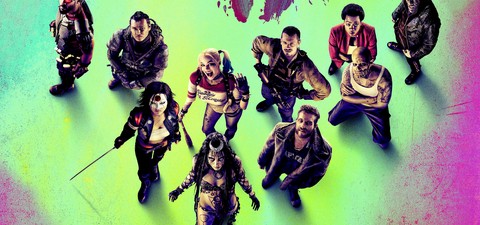
After the triumph of the Snyder Cut campaign for Justice League, DC devotees aimed to bring about the release of the director’s cut for another divisive project with David Ayer's 2016 film Suicide Squad. Following a seven-year wait since its initial release, fans have now received an update from the director himself.
Ayer wrote a post on Twitter discussing his feelings on those who enjoy “mocking” the film, asking, “[h]ave you ever had an experience in life that didn’t [end] the way you wanted, that dragged you, that made you rethink everything? I have." He believes his unreleased version of Suicide Squad is superior to the theatrical release and reveals the encouraging note James Gunn, co-CEO of DC Studios, told him regarding its potential for release:
“All I know is my unseen film plays much better than the studio release. The interest in my cut being shown seems real and organic. And Gunn told me it would have it’s time to be shared."
The director once described his cut of Suicide Squad as a “soulful drama” that is “complex, beautiful and sad.” He previously confirmed that a director’s cut “definitely exists” and that it was up to then-owners AT&T and HBO Max to “let it see the sunlight.”
This recent revelation made me wonder about the existence of other films tucked away in a vault somewhere, destined to remain unseen. Here are five notable examples that hold tremendous potential if they were ever released to the public (but most likely will never be).
David Fincher’s Cut of Alien 3 (1992)
David Fincher is one of Hollywood’s most talented directors, having helmed such works as Se7en, Fight Club and Gone Girl. Prior to his immense success in the industry, he directed the third Alien entry, a venture that nearly pushed him to leave the industry he is now held in such high regard of. The film stars Sigourney Weaver reprising her iconic role of Ellen Ripley as she crash lands on the heavily guarded prison called Fiorina 161.
Production on Alien 3 faced significant challenges right from the start, leading to Fincher's complete disavowal of the final product. An updated edition of the film, referred to as the Assembly Cut, was released in 2003 and aimed to replicate Fincher's initial workprint by incorporating an extra 25 minutes of footage. Although the Assembly Cut garnered a more positive reception compared to the original, it is important to note that Fincher was not directly involved in its creation. The revised version was crafted by Charles de Lauzirka, the director of Alien franchise documentaries. Despite the additional footage, Fincher distanced himself from the Assembly Cut, considering it a departure from his creative vision.
Joel Schumacher’s Cut of Batman Forever (1995)
Joel Schumacher's Batman Forever serves as the third installment in the original Batman film series, which began with Tim Burton's directed entries in 1989 and 1992. Val Kilmer took over the role of the titular character in an entry that notably embraced a more comical tone compared to its predecessors.
In a Playlist interview held in July of this year, Batman Forever co-writer Akiva Goldsman shed light on the existence of Schumacher's original version of the film. Goldsman confirmed that this version indeed exists and explained how the director had to adjust the theatrical cut to cater to a more family-friendly audience. He stated the director's cut encompasses "about 35% more psychological realism in it." He continued that the focus shifts towards themes of guilt and shame, delving into deeper psychological layers. However, the preview audience's reception was not aligned with this approach. It was ultimately decided this original vision is not what was desired which led to the release of the film in its eventual form.
Goldman remains skeptical about the likelihood of another version of Batman Forever being released despite continuing interest from fans. He ultimately expresses a desire to have the opportunity to deliver this unreleased material for these diehard enthusiasts, seeing it as a means to honor the memory of Schumacher, who passed away in 2020.
Josh Trank’s Cut of Fantastic Four (2015)
In 2015, Josh Trank's Fantastic Four emerged as one of the most severely panned movies of the year. A stellar cast consisting of Michael B. Jordan, Miles Teller, Kate Mara, Jamie Bell and Toby Kebbell could not help stop this superhero film receiving a bleak score of 9% on Rotten Tomatoes. The aftermath of the film's release tarnished Trank's reputation to such an extent that it led to his removal from an upcoming Star Wars project.
The ongoing feud between Trank and 20th Century Fox certainly did not help soothe any of the pain brought forth by the less-than-stellar reception. The director openly accused the studio of consistently overriding his creative choices, leading to a final product that he had never intended to create initially. Some of the actors engaged in the production, including Toby Kebbell, have indicated that Trank's original version of the film is notably darker and an overall superior version than what was released.
John Hughes’ Cut of The Breakfast Club (1985)
1985’s The Breakfast Club stands as a timeless masterpiece within the realm of the coming-of-age genre. While its current form remains essentially flawless, occasionally adding a bit more additional content can enhance the experience. Director John Hughes initially envisioned a significantly extended version of the film, roughly an hour longer. Yet during the post-production phase, a substantial portion of the director's filmed material found itself on the cutting room floor. These removed elements included imaginative sequences featuring Andrew as a Viking, extended interactions with the insightful janitor Carl as he foresaw the teenagers’ destinies and a poignant scene involving Bender’s abusive father dropping him off at the school. In an interview with Premiere magazine in December 1999, the director, who sadly departed in 2009, disclosed that he held the only copy of this extended rendition of the film.
David Lynch’s Cut of Dune (1984)
David Lynch’s directorial genius stands unrivaled, having directed such renowned films like Eraserhead and Mulholland Drive. Nevertheless, even the most skilled director may find themselves unable to salvage a faltering project, as was the unfortunate case with the ill-fated sci-fi endeavor, Dune. Prior to Denis Villeneuve's celebrated 2021 adaptation of Frank Herbert's novel, Lynch's rendition of Dune was met with widespread disdain, earning universally negative critiques.
Lynch himself has openly labeled this iteration a "failure" and recounted it as a production filled with nightmarish challenges, primarily stemming from his lack of creative autonomy. For an artist whose triumphs are born from the realization of their unique vision, the decision to not cultivate Lynch's creative authority was certainly a choice made by the studio. The initial version of the adaptation ran slightly beyond three hours which was ultimately cut down to a more conventional two-hour theatrical version. Subsequently, several editions labeled as Extended Cuts have emerged over time, yet none have had Lynch's involvement.
Although it is reasonable to trim films for the sake of creating the most effective narrative, it is still intriguing to discuss what could have been. Hopefully, David Ayer's envisioned version of Suicide Squad will become available so that fans can have the opportunity to witness the film the way the director intended.














